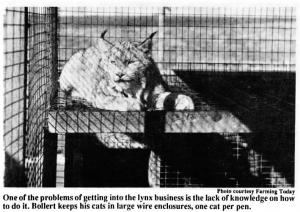Canadian Lynx Farmer Pioneers New Ground
 ✖  |
Mike Bollert's family has been in the fur business for three generations but until now it's mostly been smaller animals like mink and fox. He's changed all that in recent years by raising lynx - big, wild cats that bring premium prices because of the scar-city of quality pelts.
Lynx are larger than bobcats and smaller than cougars. Adult males weigh 40 to 45 lbs., females somewhat smaller. They have long hind legs and huge furry paws that don't quite go with their small heads and tufted ears that make them look just like a housecat.
Raising lynx is a slow business. Bollert got started in 1979 with a pair of cats trapped up in northern Canadian and he's been building up his breeding herd ever since. No pelts have yet been sold. He now has a herd of about 60 animals, 35 of which are female. He says he's ready to start selling limited numbers of breeding stock.
The reason it took so long to build up his herd is that it takes 2 to 4 years for lynx to start reproducing and three kittens is considered a large litter. They're particular about their mates and often, even though a pair may seem to get along, they may not breed. Gestation period is about 66 days. The mortality rate of kittens is high.
One of the problems of getting into the lynx business is the lack of available knowledge on how to do it. Bollert has had to learn by trial and error, in many cases using vaccines and other medicines intended for common housecats. "I'm always learning something new. As more people get into the business, I'm sure more products will be developed," he says.
Another problem with raising lynx is that unlike fox and mink, which have been raised domestically for decades, lynx remain a wild cat that must be handled with care. Bollert regularly gets bites and scratches and says he has to dope up the animals for any hands-on work.
The cats are kept in large wire enclosures, one cat per pen. Breeding pairs are put in adjoining pens with removable gates so they can get together. Bollert says they can easily handle the coldest weather - all they need is a small roofed area in the corner of their pens to get out of rain and strong winds. He feeds them a mixture of fish and chicken offal as well as commercial cereal-based feeds. Adults eat from 1 to 2 lbs. daily.
Lynx have predominately brown coats. Market price per pelt ranges from $300 to $700, depending on condition. Although prices for fur recently have been poor, Boller' says they're beginning to rebound. Breeding pairs sell for about $2,000.
For more information, contact: FARM SHOW Followup, Mike Bollert, Rt. 5, Simcoe, Ontario N3Y 4K4 (ph 519 426-4319).

Click here to download page story appeared in.
Click here to read entire issue
Canadian lynx farmer pioneers new ground AG WORLD Ag World 15-6-20 Mike Bollert's family has been in the fur business for three generations but until now it's mostly been smaller animals like mink and fox. He's changed all that in recent years by raising lynx - big, wild cats that bring premium prices because of the scar-city of quality pelts.
Lynx are larger than bobcats and smaller than cougars. Adult males weigh 40 to 45 lbs., females somewhat smaller. They have long hind legs and huge furry paws that don't quite go with their small heads and tufted ears that make them look just like a housecat.
Raising lynx is a slow business. Bollert got started in 1979 with a pair of cats trapped up in northern Canadian and he's been building up his breeding herd ever since. No pelts have yet been sold. He now has a herd of about 60 animals, 35 of which are female. He says he's ready to start selling limited numbers of breeding stock.
The reason it took so long to build up his herd is that it takes 2 to 4 years for lynx to start reproducing and three kittens is considered a large litter. They're particular about their mates and often, even though a pair may seem to get along, they may not breed. Gestation period is about 66 days. The mortality rate of kittens is high.
One of the problems of getting into the lynx business is the lack of available knowledge on how to do it. Bollert has had to learn by trial and error, in many cases using vaccines and other medicines intended for common housecats. "I'm always learning something new. As more people get into the business, I'm sure more products will be developed," he says.
Another problem with raising lynx is that unlike fox and mink, which have been raised domestically for decades, lynx remain a wild cat that must be handled with care. Bollert regularly gets bites and scratches and says he has to dope up the animals for any hands-on work.
The cats are kept in large wire enclosures, one cat per pen. Breeding pairs are put in adjoining pens with removable gates so they can get together. Bollert says they can easily handle the coldest weather - all they need is a small roofed area in the corner of their pens to get out of rain and strong winds. He feeds them a mixture of fish and chicken offal as well as commercial cereal-based feeds. Adults eat from 1 to 2 lbs. daily.
Lynx have predominately brown coats. Market price per pelt ranges from $300 to $700, depending on condition. Although prices for fur recently have been poor, Boller' says they're beginning to rebound. Breeding pairs sell for about $2,000.
For more information, contact: FARM SHOW Followup, Mike Bollert, Rt. 5, Simcoe, Ontario N3Y 4K4 (ph 519 426-4319).
To read the rest of this story, download this issue below or click
here to register with your account number.







